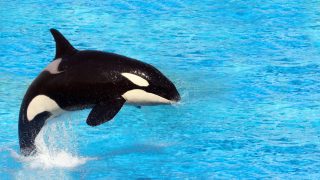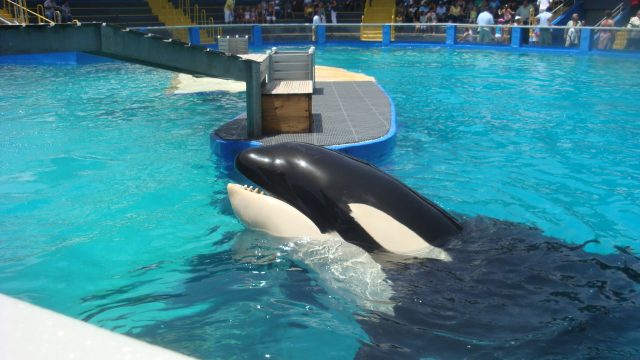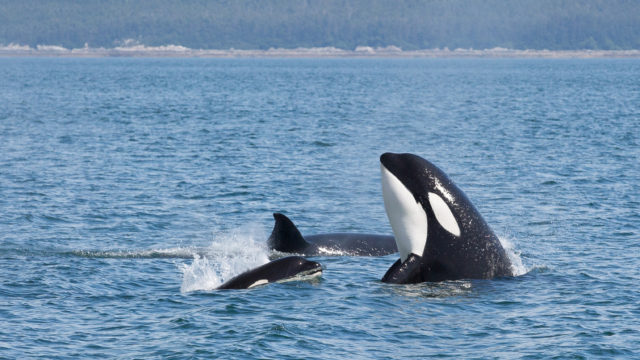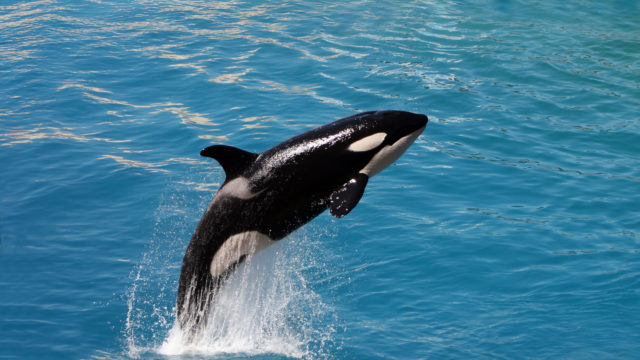
Summer/Fall 2017 New Voices in Animal Law Writing Contest: Emily Bowen
Emily Bowen, 2L at Ohio State Univ. Moritz College of Law, is the winner of our first New Voices in Animal Law Writing Contest! Her submission, “Friend,” beautifully details how Tilikum, an orca held at SeaWorld and the subject of the documentary “Blackfish,” impacted her animal advocacy.
The Animal Legal Defense Fund is working to end orca captivity in Florida and recently proposed the Florida Orca Protection Act in conjunction with a coalition of animal protection, environmental, and marine conservation groups. The Florida Orca Protection Act would prohibit breeding captive orcas, making the orcas currently in captivity the last generation to be exploited. Additionally, the Animal Legal Defense Fund continues to fight on behalf of Lolita – a long suffering orca held alone in a cramped tank in the Miami Seaquarium.
Friend
When I was seven, I had a giant poster in my room above my bed with all the different species of whales. It was called “Whales of the World” and reading the fact blurbs under each of the tails was better than counting sheep. Like most children, the Bottlenose dolphin and the orca were the two that always stood out to me. I was obsessed with movies like Flipper and Free Willy, and to this day, my brother can quote parts of Flipper because of how often I asked him to watch it with me.
When I was nine, my uncle began dating a woman who worked as a dolphin trainer at SeaWorld, San Diego. I have pictures of my brother and I with our tiny hands on the back of a shiny, grey, Bottlenose dolphin that has slid–out onto the side of the tank. We attended the Shamu show, and I remember wanting so desperately to be that trainer in the sleek, black wetsuit perched atop Shamu’s nose as he sped around the tank. We sat in the “splash zone” and screamed gleefully when our seats lived up to their name.
When I was fifteen I read The Life of Pi, and for the first time I began to battle with the ethical issues of zoos and aquariums. In the book, Pi Patel is the son of a zoo owner and the author mentions that animals in zoos are happier than those who must struggle to survive in their natural habitats. The book is fiction; still, this struck me as an interesting notion. By this time, I had been to my local zoo at least four or five times, and happy is not the word I would have used for the panting tiger languishing in the dirt under one of the three trees in the enclosure.
When I was twenty, my DVR accidentally recorded the first half of the documentary Blackfish. After two minutes of watching, I quickly programmed the DVR to record the second half, as well. My emotions ran the gamut as I watched scenes of calves being stolen from their mothers and 10,000 pound adult orcas forced to spend their lives in concrete cells so small that they were unable to turn around. Directed by Gabriela Cowperthwaite, the documentary focused primarily on one orca- Tilikum. In Chinook, a Pacific Northwest jargon, Tilikum means friend.[1]
That night, on November 3, 2013, I shared the Blackfish trailer on my Facebook page. This was an insignificant step, but my anger required me to take some sort of action, no matter how small. I found petitions online- “Free Tilikum” and “End Whale Captivity.” I signed them all and pestered my family and friends to sign them. I changed my cover photo on Facebook to a picture of an orca in the wild with the Albert Einstein quote, “Any society which does not insist upon respect for all life must necessarily decay.” I told anyone and everyone who would listen about the average life-span of a wild orca compared to a captive orca. I bombarded my friends with facts about the emotional intelligence of orcas and familial pod structures. I devoured orca documentaries on Netflix and closely followed the impact of Blackfish on SeaWorld stock and popularity.
Still, Tilikum floated in his bathtub.
Tilikum was first captured off the coast of Iceland as a young two-year old in 1983. To fully understand the impact of this capture on Tilikum, one must first know a little bit about orcas.
The orca population spans across every ocean, but each community of orcas stay within their general location. Orcas living in the Pacific Northwest never interact with those living in the Antarctic, and as a result, those pods have distinct behaviors, acoustics, and food preferences. Even pods within the same general location have distinct dialects, and tend to avoid each other. Communities of orcas have become so different that they developed to be genetically unique. Within their tight-knit families, orcas are highly social and will typically stay with their pods for their entire lives. These pods are led by a matriarch and range from two to fifteen animals. Given the size of the orca brain, scientists rank them as incredibly intelligent, and possibly even more emotionally complex than humans. Since orcas are so socially dependent, being separated from their pods causes severe stress and emotional pain. [2]
After being ripped from his family, Tilikum spent a year at a marine park before being transferred to Sealand.[3]
At Sealand, Tilikum shared a tank with two older, female orcas and was often found bloodied from teeth marks. It is likely that Tilikum and the other orcas vocalized differently and one can equate the situation to being kidnapped and held in a room with people who speak Russian when you only speak French. The Blackfish documentary follows the life of Tilikum and chronicles the deaths of three people who were attacked by him. The documentary made it clear that Tilikum’s aggressiveness was a product of unbearable boredom and psychosis brought on by confinement in an unnatural and insufficient habitat. As the largest orca in captivity, Tilikum was particularly effected by the shallow tanks and quickly developed the collapsed dorsal fin that only happens to whales in captivity because of their unnatural diet and swimming in endless circles.[4]
Tilikum suffered for twenty-five years for SeaWorld’s financial gain and his story devastated and infuriated me. I could not stop thinking about the mental and physical torture that he was enduring daily. I wanted to make a significant contribution to ending whale captivity, but I was living in Colorado at the time, so picketing at the gates of a SeaWorld was not an option. I soon realized that, short of breaking into SeaWorld and carting Tilikum off to the ocean myself, the only way to truly impact the treatment of captive animals was through legal measures.
My endless Google searches quickly uncovered the 2011 lawsuit brought by People for the Ethical Treatment of Animals (PETA) against SeaWorld, in which PETA argued that SeaWorld’s despicable treatment of the orcas was a violation of the Thirteenth Amendment.[5] Tilikum was named as one of the five plaintiffs in the case. At the time of my discovery, I was still an undergraduate with little to no knowledge of the law. To me, a constitutional argument on what seemed like a cut and dry moral issue felt like a fool-proof win. Well, unfortunately for Tilikum, the court had a less simplistic view and ruled in favor of SeaWorld. Whether PETA’s argument was sound or not, the notion that one could bring a lawsuit on behalf of an animal was eye-opening for me. Prior to this point, the only animal cases I had ever encountered were misdemeanor vicious dog cases that typically featured an abused dog who had lashed out. Even in those instances, the dog was not a party in the case. In 2013, I was still three years away from attending law school and in my ignorance, I had not realized that animal rights law was anything more than a meaningful hobby.
The more research I conducted, the more I realized that being an animal rights lawyer, whether part-time or full-time, was a viable career option. This revelation made my heart sing. After all, it is rare in this day and age that one’s passions and one’s career commingle. I also learned that there is more than one legal avenue to achieve positive change for an animal or a species. For example, while PETA chose a constitutional tactic, a more recent case against SeaWorld is for false advertising. [6] This case was brought by four San Francisco plaintiffs who say that they purchased entry tickets to SeaWorld because they were under the impression that the company was focused on marine conservation and animal welfare. The plaintiffs claim that they were deceived by the theme park’s advertising, specifically in relation to the killer whales. On January 30, 2017, just twenty-four days after Tilikum’s death, the judge in the case denied SeaWorld’s motion to dismiss. This case taught me that being a legal advocate for animals could come in a multitude of different forms and that direct representation is not the only way to make a difference.
Tilikum’s story sparked a national outrage that has led to small victories like the pending false advertising lawsuit. Tilikum’s story also resonated with me and has followed me into my legal career. It has been four years since the night I sat on my parents’ couch with tears in my eyes as I watched images of Tilikum bobbing listlessly in his artificial prison. I am now a 2L attending The Ohio State University Moritz College of Law and prior to the start of my second semester of 1L year, Tilikum died on January 6, 2017. His death was a poignant and timely reminder that I have a duty to use my future knowledge and status to assist all creatures. No animal should endure such suffering at the hands of humans, and the thought of how many long, lonely nights Tilikum spent in his confinement made his death a bitter relief.
Seeing the change that has already occurred because of Tilikum has been one of the driving forces behind my continued passion for animal rights law. For example, SeaWorld’s greed and complete disregard for the welfare of the animals was exposed and they have been forced to reevaluate their actions. This year, SeaWorld announced that they would be ending their captive breeding program of orcas. This kind of impact is one that every law student dreams of as they lay drooling on top of their Torts book. To be able to have a real, significant effect on the world would be worth so much more than simply pursuing financial wealth. To me, the road to respect for all creatures seems to be arduous and endless, but animals like Tilikum are a perfect reminder of why animal rights attorneys are so necessary. That, and animals cannot represent themselves in court.
As a continuously busy law student, I sometimes struggle to remember why I wanted to pursue a future in the legal field. Then I see a news article about an animal being exploited for human greed and I am able to refocus. I eagerly look forward to the day when I can wield the law on behalf of the voiceless and forgotten animals. Whether I contribute to the animal rights field as a full-time attorney or by taking pro bono cases, I am confident that I will be able to assist animals like Tilikum in a variety of ways.
I have grown in height and in knowledge since I was a seven-year old with a whale poster above my bed. Fortunately, my passion for animals has also grown. Someday, I hope that animal rights lawyers will have achieved freedom for all captive animals. In that future, I will take my children to see live orcas, but the view will be from a boat with ocean water lapping against the hull. I will point to the perfectly straight dorsal fins gliding through a limitless habitat and I will tell my children that this is what it means to be a friend.
About Emily Bowen:
Originally from Colorado, Emily and her husband moved to Ohio to pursue separate graduate degrees. As an avid animal lover, Emily was looking for a way to get involved after surviving 1L year, so she joined the Moritz College of Law SALDF chapter. As vice president, she is working to expand the chapter and to make it a more prominent part of the Columbus community. Emily isn’t sure what specific area of law she intends to practice after graduation, but she is certain that she will use her degree to make a positive impact on animal rights.
[1] Martin Evans, The Story Behind Tilikum the Killer Whale, THE TELEGRAPH (Feb. 26, 2010. 9:41 AM), http://www.telegraph.co.uk/news/worldnews/northamerica/usa/7322889/The-story-behind-Tilikum-the-killer-whale.html.
[2] Facts About Orcas, WHALES AND DOLPHIN CONSERVATION, http://us.whales.org/wdc-inaction/facts-about-orcas.
[3] Philip Hoare, Blackfish: When Killer Whales Attack, THE TELEGRAPH (June 5, 2016, 9:00 AM), http://www.telegraph.co.uk/films/2016/06/05/blackfish-when-killer-whales-attack.
[4] Orca Dorsal Fin Controversy–Experts vs. Seaworld, OCEAN ADVOCATE (April 16, 2013), https://oceanadvocatefl.wordpress.com/2013/04/16/orca-dorsal-fin-controvery-experts-vsseaworld.
[5] PETA Sues SeaWorld for Violating Orca’s Constitutional Rights, PEOPLE FOR ETHICAL TREATMENT OF ANIMALS (Oct. 25, 2011), https://www.peta.org/blog/peta-sues-seaworldviolating-
orcas-constitutional-rights.
[6] Anderson v. Seaworld Parks & Entm’t, Inc., 132 F. Supp. 3d 1156, 1156 (N.D. Cal. 2015).
Related
-
Lolita the Orca Dies at the Miami Seaquarium
Captured from her wild family as a juvenile, Lolita endured decades of inhumane conditions, spurring protests and numerous legal actions to help her.August 22, 2023 News -
Statement on Lolita
Response to Announcement to Return Lolita to Puget SoundMarch 30, 2023 Press Release -
2019 Florida Legislative Session Kicks into Gear
This year’s Florida legislative session promises to be one of the busiest yet for animals. The Animal Legal Defense Fund is in the halls of the legislature every day – advocating for animals who would otherwise not have a voice.March 18, 2019 News



